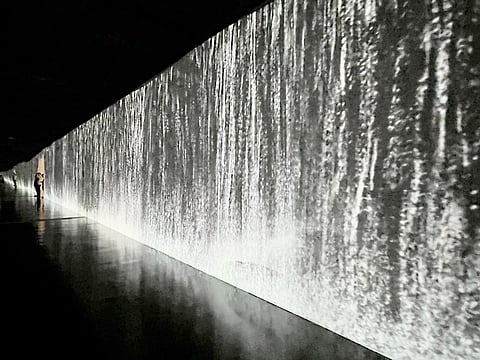
- NEWS
- the EDIT
- COMMENTARY
- BUSINESS
- LIFE
- SHOW
- ACTION
- GLOBAL GOALS
- SNAPS
- DYARYO TIRADA
- MORE

At South Korea's Jeolla region is a city well-endowed with arts and culture.
Gwangju, the country's sixth largest city, is considered home to many cultural relics as much as it is to stimulating pieces of art we saw for ourselves at a familiarization trip by the Korea Tourism Organization Manila office in partnership with the Gwangju Tourism Organization and the Jeolla Nam-do Tourism Organization.
Here are some must-see places when in Gwangju.
Asia Culture Center
The Asia Culture Center is an international culture complex that opened in 2015.
With a gross area of 139, 217 m2, ACC exceeds the scale of the National Museum of Korea (137, 135 m2) and the Seoul Arts Center (121, 841 m2).
It is divided into seven main areas: ACC Culture Exchange that houses six well-preserved buildings remodeled into exhibition spaces; ACC Creation where cultural experiments and performing arts are converged; ACC Archive and Research where studies and educational programs on Asian culture are held; ACC Theater for the performing arts; ACC Children where culture is embedded into education for children; Asia Plaza and Media Wall; and outdoor spaces offering an unobstructed view of the whole complex.
ACC is located at 38, Munhwajeondang, Dong-gu, Gwangju. It is open from 10 a.m. to 8 p.m. It is however closed every Mondays and on 1 January. Contact 1899
-5566. Visitors can take the subway and get off at Munhwajeondang Station.
Wolbongseowon Confucian Academy
In honor of Confucianist Dae-Seung, Confucian scholars established the Wolbongseowon Confucian Academy seven years after his death in 1578.
Dae-Seung, one of the greatest scholars during the Yi dynasty, was self-educated before serving as a national public official. Later on, he became the president of Seonggyungwan, the only national university at his time.
When he passed away at the age of 46 he was worshiped as Duck Won Kun, a rank and title of nobility.
The Confucian Academy was built with the Mangcheonsa Shrine in Nagam. Unfortunately, it was damaged during the Japanese invasion of Korea in 1654. It was later moved to its current location with an added shrine, dormitory, and a lecture hall.
Every year in March and September, Hyangsa, a memorial ceremony, is held in the Sungdeoksa Shrine to honor Dae-Seung's studies and virtue.
Wolbongseowon Confucian Academy is located at 133, Gwanggok-gil, Gwangsan-gu, Gwangju. Contact 062
-951-6434.
Leeleenam Studio
Artist Lee Lee Nam's works penetrate the past and the present.
Leeleenam Studio, which opened in February 2021, is a cultural creation space built by the contemporary media artist. It is divided into six areas: Studio 0 (artist space), Studio 1 (cafe, first floor), Studio 2 (Cafe, second floor), Studio 3 (roof top), Studio 4 (Media art museum), and Studio 5 (creative studio).
Located with Yangnimsan behind it, visitors can enjoy an excellent view of Mudeunsan Mountain while in the studio.
Leeleenam Studio is located in 10, Jejung-ro 47beon-gil, Nam-gu, Gwangju. It is open daily from 10 a.m. to 9:30 p.m. Contact 062-655-5030. Visitors can take the Namgwangju Station, Gwangju Metro Line 1, Exit 3.
